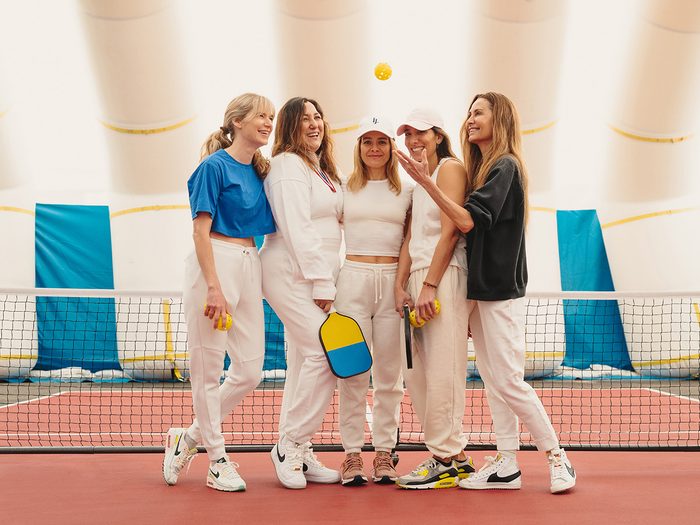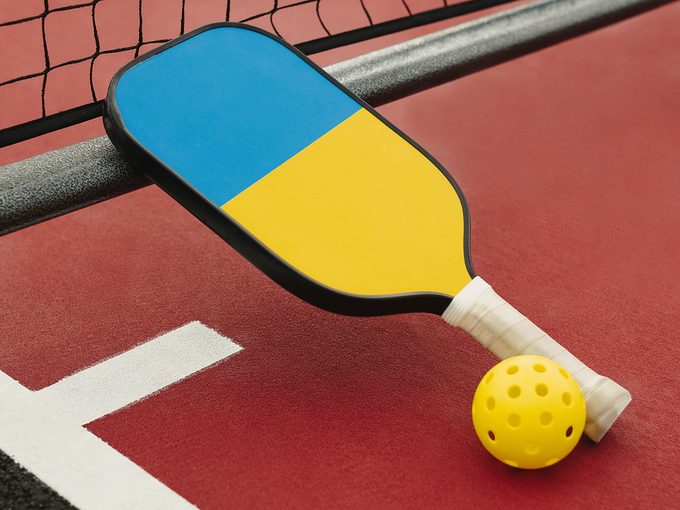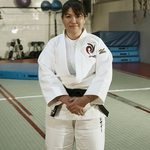Why Everyone’s Playing Pickleball Right Now

One million Canadians play pickleball every single month. Here's what's behind the sudden popularity—and how to get started.
Leonardo DiCaprio is obsessed with it. LeBron James bought a team. Grand Slam tennis champ Serena Williams said she could make it her second career. And, recently, my friends and I also picked up this buzzy racquet sport.
Pickleball is the fastest-growing sport in North America, boasting nearly 5 million players on this continent with millions more worldwide. From 2020 to 2022, the number of participants in Canada tripled, with about one million “picklers” playing monthly. Although older adults were the early adopters, today the largest increase is among millennials, with female participants outnumbering men in most age groups.
The sport is an amalgam of badminton, table tennis and tennis. Just swap a tennis racquet for a smaller, solid-faced paddle and the fuzzy ball for a plastic Wiffle ball, set the net eight inches lower, shrink the court down to about a quarter of its size and you’ve got the makings of a pickleball game. The condensed playing field makes it less taxing on the body and allows for more rallies—and chit-chat. For first-timers, these differences make the sport more welcoming and easier to pick up.
Pickleball might seem like it arrived to enthusiastic fanfare overnight. However, its inception can be traced back to the summer of 1965, when three American dads concocted the game while trying to entertain their bored kids. More recently, it surged in popularity during the pandemic lockdown, when many people were looking for new outdoor activities to help them safely stay fit. Pickleball has now made the leap from backyard pastime to primetime, with televised matches and celebrity tournaments.
Drummond Munro, a lifelong racquet-sports enthusiast, was introduced to pickleball in South Carolina six years ago. This past summer, he co-founded Fairgrounds Public Racket Club, a public pickleball court in Toronto, and has plans to roll out more locations across Canada. Munro’s goal is to introduce the sport more widely and democratize the culture around sports clubs. “We’re building a new type of social club that removes that elitist, exclusive nature often associated with traditional clubs,” says Munro. While many sports clubs have invitation-only admittance and high initiation fees, plus yearly dues and minimum spends, Fairgrounds is accessible to all ages—anyone can book a court time online—and inexpensive ($10 per visit, with free admission on Tuesdays).
Catherine Parenteau, 27, is a Montreal native and the number two-ranked international pro pickleball player. She picked up the sport seven years ago after being sidelined from competing in tennis once her full scholarship at Michigan State University ended. Since she began touring as a pro pickleball player, she’s witnessed the sport explode worldwide. “It’s much easier than other [racquet] sports to get a rally going because the ball doesn’t bounce as much. This allows you to control your shots more and keep the ball going,” says Parenteau. She also likes that the sport is inclusive and crosses all generations and abilities. “I can hit balls with my grandmother and have great rallies. You can play with someone of any age and level.”
The initial draw for my own group of friends was the social aspect that allowed us to participate in an event together. That we could learn a new sport while engaging in an athletic activity outdoors was simply a bonus. Pickleball strikes the perfect balance of fun and fitness. Plus, it’s beginner-friendly, which makes it easy for newcomers to join our pick-up matches. Our rotating roster of friends and family balloons every week—it even brought out our Gen Z offspring. By 2030, pickleball is projected to have 40 million people playing worldwide, and our kids and parents will likely be included among those fans.

The health benefits of pickleball
Here are all the ways this racquet sport is a smash hit for your body and mind.
Heart Health
Pickleball combines short bursts of intensity with periods of recovery, which is a great way to condition the heart and strengthen your cardiovascular system, says registered physiotherapist Meg MacPherson.
Muscle Control and Strength
“Our bodies are designed to move—and to move in various directions. These sudden multidirectional movements improve muscle control. Over the course of a match, you’ll engage nearly every muscle from the upper body to your legs and core,” says MacPherson.
Cardio Boost
You can expect a heart-pumping workout during an hour-long match. According to researchers at the University of Manitoba, people playing singles or doubles can clock heart rates that indicate moderate to vigorous activity. Apple recently added pickleball to its roster of trackable workouts; on average, you can burn 400 to 700 calories per hour.
Agility
With its sudden movements and lower downtime, pickleball encourages agility and a higher control of your actions, says MacPherson. That allows you to react swiftly and effectively to your environment.
Social Connection
MacPherson notes that participating in a sport that allows you to engage with others can release endorphins (those feel-good brain chemicals that also work as a natural painkiller).
Coordination
Racquet sports famously improve hand-eye coordination, a skill essential for initiating and reacting to action.
Up Your Game
Three expert tips from Catherine Parenteau:
- Always try to return the ball deep (meaning close to the opponent’s baseline) so you have time to set up your next shot.
- Ensure the ball’s contact point is in front of your body for maximum control of your shot.
- Don’t be afraid of the “kitchen”—a zone that extends seven feet from the net on both sides. While you can’t enter the kitchen if the ball hasn’t already bounced, you can still reach in to hit it as long as you keep your feet behind the kitchen line.




